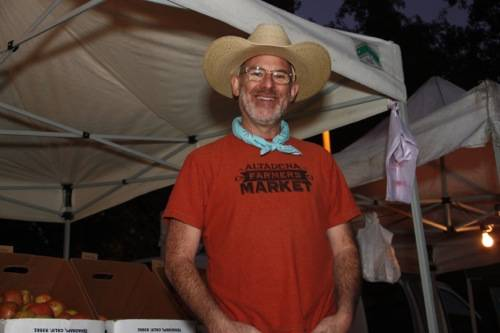by Timothy Rutt
 The Altadena Chamber of Commerce and Civic Association has named the Altadena Farmers’ Market as Business of the Year. In just a short time since the market's opening in May 2012, the Wednesday market has become the crown jewel in Altadena’s growing reputation as a center for food culture in Los Angeles.
The Altadena Chamber of Commerce and Civic Association has named the Altadena Farmers’ Market as Business of the Year. In just a short time since the market's opening in May 2012, the Wednesday market has become the crown jewel in Altadena’s growing reputation as a center for food culture in Los Angeles.
Altadena’s Farmers’ Market gets rave reviews in the LA Times, LA Weekly, and Bon Appétit Magazine for its mix of organic small farmers, urban growers, and artisanal food vendors. Only a year-and-a-half old, it’s already a local institution. Not bad for an enterprise that was unlikely from the start.
Altadena and Los Angeles County officials spent years trying -- and failing -- to set up a local farmers’ market. Until Joseph Shuldiner stepped in.
Shuldiner is a most unlikely market manager. He isn’t a farmer, chef, or restauranteur by training. A former art director for the Los Angeles Times, Shuldiner designed print publications for a living, and said, “I found that field dwindling, and wasn’t interested in designing for digital media at the time.”
He found a niche doing cookbook design. He worked with Sue Campoy, founder and chef at Julienne in San Marino, on the distillation of her life’s work, Celebrating with Julienne (Prospect Park Books). Working so closely with one of the great local chefs made Shuldiner want to write his own cookbook.
The result was Pure Vegan (Chronicle), which opened doors for him in Altadena’s burgeoning food culture. He was asked to be on the board of the Arroyo Food Co-op, where he met Steve Rudicel and Gloria Putnam, who reside at Altadena’s historic Zane Grey Estate, now an urban farm. “The second we locked eyes, we knew -- we were going to create a lot of stuff here,” Shuldiner said.
In 2010, the Zane Grey Estate hosted the Altadena Urban Farmer’s Market, a monthly gathering of local food producers and other vendors, totally unregulated and “underground” (although everyone knew about it). Shuldiner designed the market’s logo and held vegan cooking demonstrations at the events.
Shuldiner also founded the Institute of Domestic Technology, which offers classes in artisanal foodmaking skills, from cheeses to cocktails, taking place at the Zane Grey Estate and at Greystone Mansion in Los Angeles.
After the Urban Farmer’s Market closed its doors -- it outgrew the estate, a victim of its own success -- he was approached by the county to be the manager of the frequently-promised-but-never-arriving farmers’ market. Shuldiner, who had never done anything like this before, agreed.
But getting it up and running took a year, slogging through county paperwork, finalizing a location (the parking lot at Loma Alta Park) and arranging financing. “What took a year in developing it was working out the financial structure to make it viable for me. [The county] was going to charge me to rent the parking lot, That’s when Altadena Heritage stepped in and discovered that if we had a nonprofit sponsor, they wouldn’t charge me anything. That’s when the organization agreed to be the market’s founding sponsor.”
Along the way, Shuldiner was remaking himself, going through a crash course in farmers’ market management. “I really owe everything to Greta Dunlap, at the time the market manager for the South Pasadena Farmers’ Market. She was and continues to be an incredible mentor for me.”
When the market finally opened May 30, 2012, it was unlike any other farmers’ market. Some of the farmers were making their first appearance in LA County, and some underground market vendors were providing food cooked in their own home kitchens, but now as certified and approved businesses.
The market reflects Shuldiner’s approach: “An ephemeral aspect is my art direction background, in how highly curated [the market] is,” Shuldiner said. If he can’t find the right vendor, he’s not afraid to let booth space go empty. “Other markets will fill up with craft booths, massage therapists -- I specifically curate it like a gallery show. These are particular types of vendors.”
Among the unique aspects of the Altadena market is that it serves as an incubator for people who are ramping up what may have started as a hobby or passion into a viable business. “We are intentionally incubating new startup businesses, in packaged and prepared food, stuff like that,” Shuldiner said. “We’re probably one of the only markets that has a cohesive backyard farmer program.” One of the things Shuldiner urges the prepared food vendors to do is to buy from market’s own farmers. “It’s a lot more work on my end, but that’s how I do it.”
With its emphasis on organic food from small-scale farmers, the market does have a reputation of being pricier, but Shuldiner says that the market also has a commitment to make sure that its wares it can be available for low-income households. The market takes EBT cards and is one of only 12 markets that participate in Market Match, a program administered by Hunger Action LA that doubles EBT cards through WIC.
While there are many farmers and vendors, the market itself is lightly staffed: Elizabeth Bowman is the assistant manager, whom Shuldiner calls “Assistant Secretary of Urban Farming.” Daniel Kent, also assistant director at the Institute of Domestic Technology, is the “Dean of Beverages.” Also working at the market are Salim Moore, Leigh McGilvray (information), and Richard Kleimeier (security).
Shuldiner says that he appreciates the support of Silvera Grant and the board of the Altadena Community Garden, the Market’s neighbor and current sponsor.
Shuldiner’s success at the market has led him to consult on the re-imagining of the Grand Central Market in downtown Los Angeles, which he thinks is an extension of the work he is doing in Altadena.
“Running a farmers’ market is something that feels so natural to me,” Shuldiner said. “It’s not that I struggle, or wanted to write software or something. It’s a coalescence of all of my skills before this, to be able to apply it in a new area -- my art direction, curating, food, being around chefs -- it feels really natural, that’s all I can say.”




